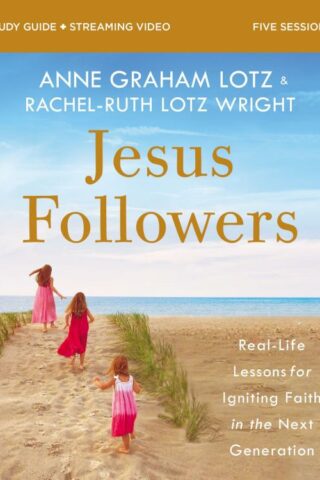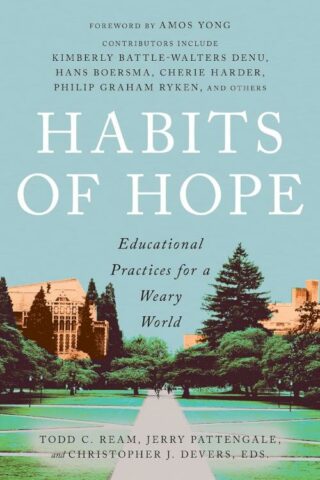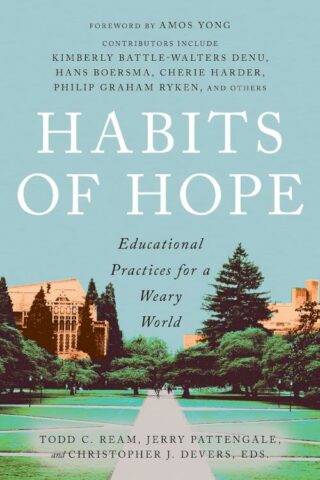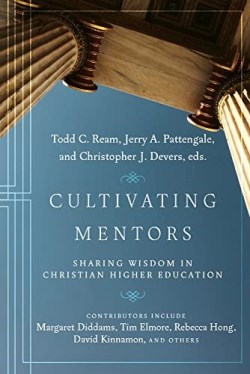Jerry Pattengale
Showing all 4 resultsSorted by latest
-
Habits Of Hope
$27.99In the world of education, disorientation and uncertainty has been increasing for several decades, with the Covid-19 pandemic only exacerbating preexisting challenges. Christians called to academic vocations need authentic hope to sustain them in their work-and they need to be able to share that hope with a weary world.
Habits of Hope explores a Christian understanding of hope and how it applies to the work of educators, administrators, scholars, and others in academia. Essays by master practitioners focus on six key educational practices and describe how these practices can cultivate hope within educators as well as among their students and everyone they serve:
*integration
*conversation
*diversity
*reading
*writing
*teachingContributors include Hans Boersma; Kimberly Battle-Walters Denu; Kevin G. Grove, CSC; Cherie Harder; Jon S. Kulaga; Philip Graham Ryken; David I. Smith; and Jessica Hooten Wilson.
Christian hope, these thinkers are convinced, has two fundamental characteristics: it’s tied inextricably to the world to come, inaugurated by the life, death, and resurrection of Jesus Christ; and it’s active in its very nature. Habits of Hope combines theology and practical application to help educators find hope and infuse it throughout every area of their work.
Add to cartin stock within 3-5 days of online purchase
-
Habits Of Hope
$26.99In the world of education, disorientation and uncertainty has been increasing for several decades, with the Covid-19 pandemic only exacerbating preexisting challenges. Christians called to academic vocations need authentic hope to sustain them in their work-and they need to be able to share that hope with a weary world.
Habits of Hope explores a Christian understanding of hope and how it applies to the work of educators, administrators, scholars, and others in academia. Essays by master practitioners focus on six key educational practices and describe how these practices can cultivate hope within educators as well as among their students and everyone they serve:
*integration
*conversation
*diversity
*reading
*writing
*teachingContributors include Hans Boersma; Kimberly Battle-Walters Denu; Kevin G. Grove, CSC; Cherie Harder; Jon S. Kulaga; Philip Graham Ryken; David I. Smith; and Jessica Hooten Wilson.
Christian hope, these thinkers are convinced, has two fundamental characteristics: it’s tied inextricably to the world to come, inaugurated by the life, death, and resurrection of Jesus Christ; and it’s active in its very nature. Habits of Hope combines theology and practical application to help educators find hope and infuse it throughout every area of their work.
Add to cartin stock within 3-5 days of online purchase
-
Cultivating Mentors : Sharing Wisdom In Christian Higher Education
$26.99Many colleges and universities informally highlight the value of mentoring among academic professionals.
Yet scholars often lack clear definitions, goals, practices, and commitments that help them actually reap the benefits mentoring offers. As new faculty members from younger generations continue to face evolving challenges while also reshaping institutions, their ability to connect with more experienced mentors is critical to their vocations–and to the future of higher education.
In Cultivating Mentors, a distinguished group of contributors explores the practice of mentoring in Christian higher education. Drawing on traditional theological understandings of the mentee-mentor relationship, they consider what goals should define such relationships and what practices make their cultivation possible among educators. With special attention to generational dynamics, they discuss how mentoring can help institutions navigate generational faculty transitions and cultivate rising leaders. Contributors include:
*David Kinnaman
*Tim Clydesdale
*Margaret Diddams
*Edgardo Colon-Emeric
*Rebecca C. Hong
*Tim Elmore
*Beck A. Taylor
*Stacy A. HammonsThis book offers valuable insights and practical recommendations for faculty members, administrators, and policy makers. Whether pursuing their vocation in Christian or secular institutions, Christian scholars will benefit from the sharing of wisdom mapped out in Cultivating Mentors.
Add to cartin stock within 3-5 days of online purchase
-
Public Intellectuals And The Common Good
$26.99In the midst of a divisive culture, public intellectuals speaking from an evangelical perspective have a critical role to play-within the church and beyond. Representing the church, higher education, journalism, and the nonprofit sector, these world-class scholars and practitioners cast a vision for intellectuals who promote human flourishing.
Evangelical Christians are active across all spheres of intellectual and public life today. But a disconnect remains: the work they produce too often fails to inform their broader communities. In the midst of a divisive culture and a related crisis within evangelicalism, public intellectuals speaking from an evangelical perspective have a critical role to play-within the church and beyond. What does it look like to embrace such a vocation out of a commitment to the common good? Public Intellectuals and the Common Good draws together world-class scholars and practitioners to cast a vision for intellectuals who promote human flourishing. Representing various roles in the church, higher education, journalism, and the nonprofit sector, contributors reflect theologically on their work and assess current challenges and opportunities. What historically well-defined qualities of public intellectuals should be adopted now? What qualities should be jettisoned or reimagined? Public intellectuals are mediators-understanding and then articulating truth amid the complex realities of our world. The conversations represented in this book celebrate and provide guidance for those who through careful thinking, writing, speaking, and innovation cultivate the good of their communities. Contributors:
*Miroslav Volf
*Amos Yong
*Linda A. Livingstone
*Heather Templeton Dill
*Katelyn Beaty
*Emmanuel Katongole
*John M. Perkins and David WrightAdd to cartin stock within 3-5 days of online purchase













